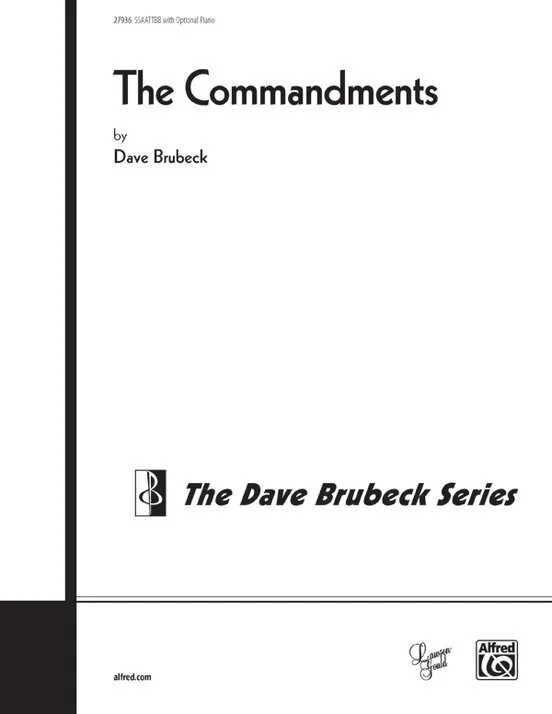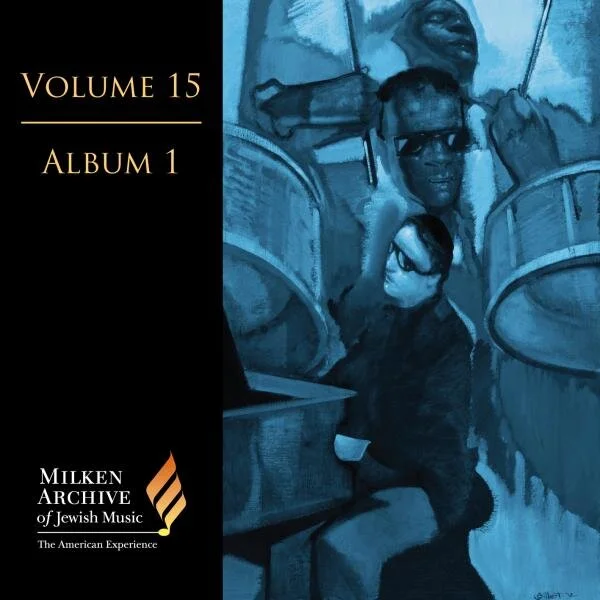THE COMMANDMENTS (2005)
The Wolf Pack Band, with Dave Brubeck at the piano, playing for troops during WWII.
OVERVIEW
The Commandments was composed in 2005, but the events of Dave’s experience in WWII decades earlier inspired him to write a work based on his observations.
From the Liner Notes by Neil W. Levin for the 2007 recording:
“… the experience of war being pursued by supposedly civilized societies ignited in him a sense of urgency for humanity as a whole to renew acquaintance with the biblical commandments and the moral and ethical values they promote.
The cantata is divided into two distinct parts, which are interwoven throughout. The first addresses the commandments with direct musical statements. The second part is more narrative, describing the circumstances and depicting the powerful visual and aural images surrounding the awe-inspiring revelation of the precepts of aseret hadibrot at Mount Sinai: the thunder and lightning and the sounding of the shofar; the smoke rising from the mountain and the enveloping flames; the “Majestic Voice” pronouncing the commands; and the people’s lapse and raucous descent into idolatry.” - Neil W. Levin
Read the full Liner Notes on the Milken Archive website here.
DETAILS
(2005) 8 min.
INSTRUMENTATION
SSAATTBB with Optional Piano*
*optional parts for brass (4-3-3-3-1), timpani and percussion available from Alfred Publishing
MUSIC
Dave Brubeck
TEXT
Adapted from Exodus 20:1-22
WORLD PREMIERE
September 14, 2005 at the Rose Hall at Lincoln Center in New York City.
PURCHASE & LICENSING
For more information contact Derry@BrubeckMusic.com
WATCH & LISTEN NOW
In an interview with conductor Russell Gloyd, Dave Brubeck discusses the timelessness and universal import of the Bible's Ten Commandments, as well as humanity's continued responsibility to live by them. Includes video footage from the 2007 Milken Archive recording session with the Singing City choir and Fairmount Brass, conducted by Russell Gloyd at the Bryn Mawr Presbyterian Church in Bryn Mawr, Pennsylvania.
Click here for the liner notes from the 2007 Milken Archive recording of The Commandments, along with more information about the recording.
A Note from the Composer
by Dave Brubeck
During World War II, I was a soldier in the 140th Infantry Regiment of Patton’s Army in the European Theater. As a soldier, almost overnight your thinking becomes far more directed toward philosophy, religion and survival. You are no longer that lighthearted individual that didn’t seem to have a care in the world. Some estimate that the number of people killed in World War II reached sixty million. My reasoning and understanding of religion led me to question how such inhumanity could exist among people who were basically grounded in one form or another in the Commandments of the Old Testament. All supposedly prayed to the same God. The more serious the conditions of the fighting, the more seriously I examined my own conscience. Were the Commandments to be taken literally, or not?
Although I was only a PFC, the Army had assigned me as bandleader, and I was in charge of a group of musicians, many of whom had been wounded and sent back from the front. If their records showed that they had once been musicians, they were sent to my band rather than redeployed to the front lines. It was our job to entertain the troops wherever they may be.
One day in early December, the Colonel in charge of the 17th Replacement Depot issued orders that I take the band “on a Cook’s Tour.” After driving a few miles we found a clearing in the woods where there were many G.I.s lining up in a chow line, so I had the drive stop the truck and we began to set up our instruments to play for these soldiers. Suddenly, a plane flew over us . Hardly anyone paid attention because at this time the German air force had almost stopped reconnaissance. Then, on the the G.I.s shouted “Hey! That’s a Germany plane, and he’ll be coming back!” Everyone scrambled away from the clearing to find a protected position. We hastily climbed back into our truck and drove out of there. As there were no maps of this section with us, we chose the road that seemed most traveled. Unfortunately it was now growing dark. Our truck was not allowed to turn on the lights. We came to a soldier directing traffic, who, using a dim hooded light, waved us through. As we passed him, I realized that he was wearing a German helmet. I told our driver to go over the hill, and when he reached a point where we could not be seen, to turn around and pass by the soldier again at full speed.
Within a few miles we were stopped at a checkpoint. Now we faced American soldiers who did not believe my story that we were a G.I. band. While they were deciding among themselves what to do with us, the questioner held hand grenades with the pins pulled. Finally, they asked me for the password and that got us through the line. They explained that many of their fellow soldiers had been killed right at this point by Germany soldiers who spoke perfect English, were in an American truck and wearing G.I. uniforms. This was the beginning of what became known as the Battle of the Bulge. We drove back to almost empty headquarters, and by listening to a German radio broadcast realized that we were surrounded, and according to Axis Sally, we had lost the war. I vowed that if I survived, someday I would write a composition examining the Commandments. I was not able to form my thoughts into a composition at that moment in time. It took me over sixty years to finally put into a composition what I felt all those years ago when it was clear that all sides of the war were breaking one or all of the Commandments.
When I was interviewed in the former Soviet Union in 1987, I talked about how the governments that were in conflict should start examining the basic tenets of their culture and that our government should spend a lot of effort in the study and application of the Commandments. When Paul Schwendener, producer from the Milken Foundation that funded the recording of my “Gates for Justice,” heard that I was composing a piece about the Commandments, he thought that it should be performed at Lincoln Center when the Jewish Heritage Foundation produced a concert of “The Gates of Justice.” I told him that I would like to know if the Commandments were part of the Islamic tradition, as well as the Jewish and Christian. Intrigued by the question, he read several books on the Koran but found no mention of the Commandments. One day he reported that he had finally found what I was looking for. In one of the books he studied, believers were told they must follow the laws of Moses. Realizing the three great monotheistic religions of the world held these basic tenets in common motivated me to complete “The Commandments,” a composition I had wanted to write so long ago.
© Dave Brubeck Music

